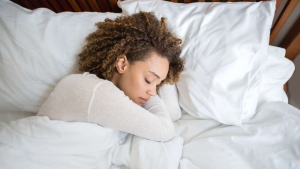The Benefits of Good Night’s Rest
The Physical Benefits of
a Full Night’s Sleep
 It takes time and effort to reach a new level of health and wellness. A well-balanced diet and plenty of exercise are usually at the top of everyone’s list. But, there’s one simple biological necessity that’s often forgotten – sleep. Sleep comes with a whole host of benefits that you probably don’t notice until you’re not getting enough of it.
It takes time and effort to reach a new level of health and wellness. A well-balanced diet and plenty of exercise are usually at the top of everyone’s list. But, there’s one simple biological necessity that’s often forgotten – sleep. Sleep comes with a whole host of benefits that you probably don’t notice until you’re not getting enough of it.
Boost Your Immune System
A well-known study published in the Archives of Internal Medicine compared the average amount of sleep of 153 participants and their susceptibility to the common cold. Getting less than seven hours of sleep made participants 2.94 times more likely to develop a cold. Those who still stayed in bed a full seven hours but slept poorly were 5.5 times more likely to get a cold.
Sleep plays a vital role in your body’s ability to make antibodies and fight off infection. In particular, it’s the deep sleep phases, where you enter slow wave sleep, that help you resist illness. However, if you’re not getting enough rest, you might not spend enough time in the deep sleep phases to give your immune system the boost it needs.
The same deep sleep phases that are so vital to immune system health are also necessary for building and repairing muscle.
Strengthen Muscles
To get a better idea of how sleep helps you gain muscle, you’ll need a little background on the sleep cycle. On an average night, you will go through five to six sleep cycles. During each cycle, you enter each of the five sleep stages. It’s during the first of the deep sleep stages, stage III, that growth hormone (GH) gets released and starts building and healing muscle tissue. GH peaks during the first sleep cycle of the night and continues to be released in smaller amounts during each subsequent cycle.
When you don’t get enough sleep, GH doesn’t peak until the second sleep cycle. And, even then, it doesn’t reach the same levels it would during a normal night of sleep. Thus, muscle recovery can be affected in two ways.
1) You don’t spend enough time asleep and
the body can’t build or repair muscle in the time allotted.
2) You go to bed late, altering the amount
of GH released and the body doesn’t build muscle as it normally would.
How to Get More (and Better) Sleep
You and I both know that getting a full night’s sleep can be harder than it seems. Stress, anxiety, or a demanding schedule can all get in the way. However, you can try:
 Following a Consistent Sleep Schedule: Consistency allows the body to regulate and correctly time the release of sleep hormones.
Following a Consistent Sleep Schedule: Consistency allows the body to regulate and correctly time the release of sleep hormones.
Developing a Calming Bedtime Routine: A bedtime routine can signal the start of the sleep cycle. It also offers you a chance to get rid of stress before bed. Meditation, gentle yoga, or reading a book are great ways to relax both mind and body at night.
Address Sleep Disorders: Excessive snoring or daytime fatigue after being in bed a full eight hours may indicate an underlying sleep disorder. Consult your physician who may suggest using a mouth guard, BiPAP machine, or CPAP machine to help you get the sleep you need.
Like all healthy changes, it might take time. But, with consistent effort, better sleep can take your physical health to new heights.

Categories
Archives
- October 2018
- September 2018
- May 2016
- March 2016
- February 2016
- December 2015
- November 2015
- October 2015
- September 2015
- August 2015
- July 2015
- June 2015
- May 2015
- April 2015
- March 2015
- February 2015
- January 2015
- November 2014
- October 2014
- April 2014
- March 2014
- February 2014
- January 2014
- December 2013
- November 2013
- October 2013
- September 2013
- August 2013
- July 2013
- June 2013
- May 2013
- March 2013
- February 2013
- January 2013
- December 2012
- November 2012
- October 2012
- August 2012
- July 2012
- November 2011
